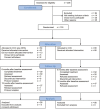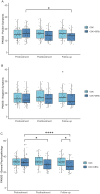Cognitive Behavioral Psychotherapy as an Add-on in Comprehensive Outpatient Care of Non-affective Psychoses: A Multicenter Randomized-Controlled Effectiveness Trial in a Naturalistic Setting
- PMID: 39004927
- PMCID: PMC12061656
- DOI: 10.1093/schbul/sbae080
Cognitive Behavioral Psychotherapy as an Add-on in Comprehensive Outpatient Care of Non-affective Psychoses: A Multicenter Randomized-Controlled Effectiveness Trial in a Naturalistic Setting
Abstract
Background and hypothesis: Non-affective psychoses (NAP) are associated with severe consequences with regard to social functioning, physical health, employment, and suicidality. Treatment guidelines recommend cognitive behavioral therapy for psychosis (CBTp) as an effective additional treatment strategy to psychopharmacology. We hypothesized that outpatient CBTp has an add-on effect in individuals with NAP who already receive comprehensive outpatient care (COC) in Germany.
Study design: In a randomized-controlled effectiveness trial, 6 months of COC + CBTp were compared to COC. The primary outcomes were change of symptom severity as assessed by the Positive and Negative Symptom Scale (pre-/post-treatment and 6-month follow-up). Mixed linear models and effect sizes were used to compare changes across treatment groups. Additionally, the number of readmissions was compared.
Study results: N = 130 individuals with chronic NAP were recruited (COC + CBTp: n = 64, COC: n = 66). COC + CBTp participants significantly improved more regarding positive symptom severity (estimated mean difference at follow-up: -2.33, 95% CI: -4.04 to -0.61, P = .0083, d = 0.32) and general psychopathology (estimated mean difference at follow-up: -4.55, 95% CI: -7.30 to -1.81, P = .0013, d = 0.44) than the COC group. In both groups, negative symptom severity did not change significantly over time nor did groups differ regarding readmissions.
Conclusion: The results underline an add-on benefit of CBTp in chronically ill individuals with NAP. Superiority of CBTp was demonstrated in comparison with high-quality comprehensive care and may also be true in different comprehensive care settings.
Clinical trials registration: DRKS00015627.
Keywords: RCT; clinical trial; schizophrenia; treatment effects.
© The Author(s) 2024. Published by Oxford University Press on behalf of the Maryland Psychiatric Research Center. All rights reserved. For commercial re-use, please contact reprints@oup.com for reprints and translation rights for reprints. All other permissions can be obtained through our RightsLink service via the Permissions link on the article page on our site—for further information please contact journals.permissions@oup.com.
Figures


Similar articles
-
Cognitive behavioural therapy (group) for schizophrenia.Cochrane Database Syst Rev. 2022 Jul 12;7(7):CD009608. doi: 10.1002/14651858.CD009608.pub2. Cochrane Database Syst Rev. 2022. PMID: 35866377 Free PMC article.
-
Early intervention for psychosis.Cochrane Database Syst Rev. 2006 Oct 18;(4):CD004718. doi: 10.1002/14651858.CD004718.pub2. Cochrane Database Syst Rev. 2006. Update in: Cochrane Database Syst Rev. 2011 Jun 15;(6):CD004718. doi: 10.1002/14651858.CD004718.pub3. PMID: 17054213 Updated.
-
Early intervention for psychosis.Cochrane Database Syst Rev. 2011 Jun 15;(6):CD004718. doi: 10.1002/14651858.CD004718.pub3. Cochrane Database Syst Rev. 2011. PMID: 21678345 Free PMC article.
-
Levetiracetam add-on for drug-resistant focal epilepsy: an updated Cochrane Review.Cochrane Database Syst Rev. 2012 Sep 12;2012(9):CD001901. doi: 10.1002/14651858.CD001901.pub2. Cochrane Database Syst Rev. 2012. PMID: 22972056 Free PMC article.
-
Cognitive behavioural therapy plus standard care versus standard care for persistent aggressive behaviour or agitation in people with schizophrenia.Cochrane Database Syst Rev. 2023 Jul 25;7(7):CD013511. doi: 10.1002/14651858.CD013511.pub2. Cochrane Database Syst Rev. 2023. PMID: 37490701 Free PMC article.
Cited by
-
[The effectiveness of inpatient treatment of psychoses-Initial results of a naturalistic study].Nervenarzt. 2025 Aug 19. doi: 10.1007/s00115-025-01871-1. Online ahead of print. Nervenarzt. 2025. PMID: 40828394 German.
References
-
- Jauhar S, Johnstone M, McKenna PJ.. Schizophrenia. Lancet (London, England). 2022;399(10323):473–486. - PubMed
-
- Hjorthøj C, Stürup AE, McGrath JJ, Nordentoft M.. Years of potential life lost and life expectancy in schizophrenia: a systematic review and meta-analysis. Lancet Psychiatry. 2017;4(4):295–301. - PubMed
-
- Ruggeri M, Leese M, Thornicroft G, Bisoffi G, Tansella M.. Definition and prevalence of severe and persistent mental illness. Br J Psychiatry. 2000;177(2):149–155. - PubMed
-
- DGPPN. S3-Leitlinie Schizophrenie. 2019. https://www.awmf.org/leitlinien/detail/ll/038-009.html. Date accessed January 23, 2023.
Publication types
MeSH terms
Grants and funding
LinkOut - more resources
Full Text Sources
Medical
Research Materials

